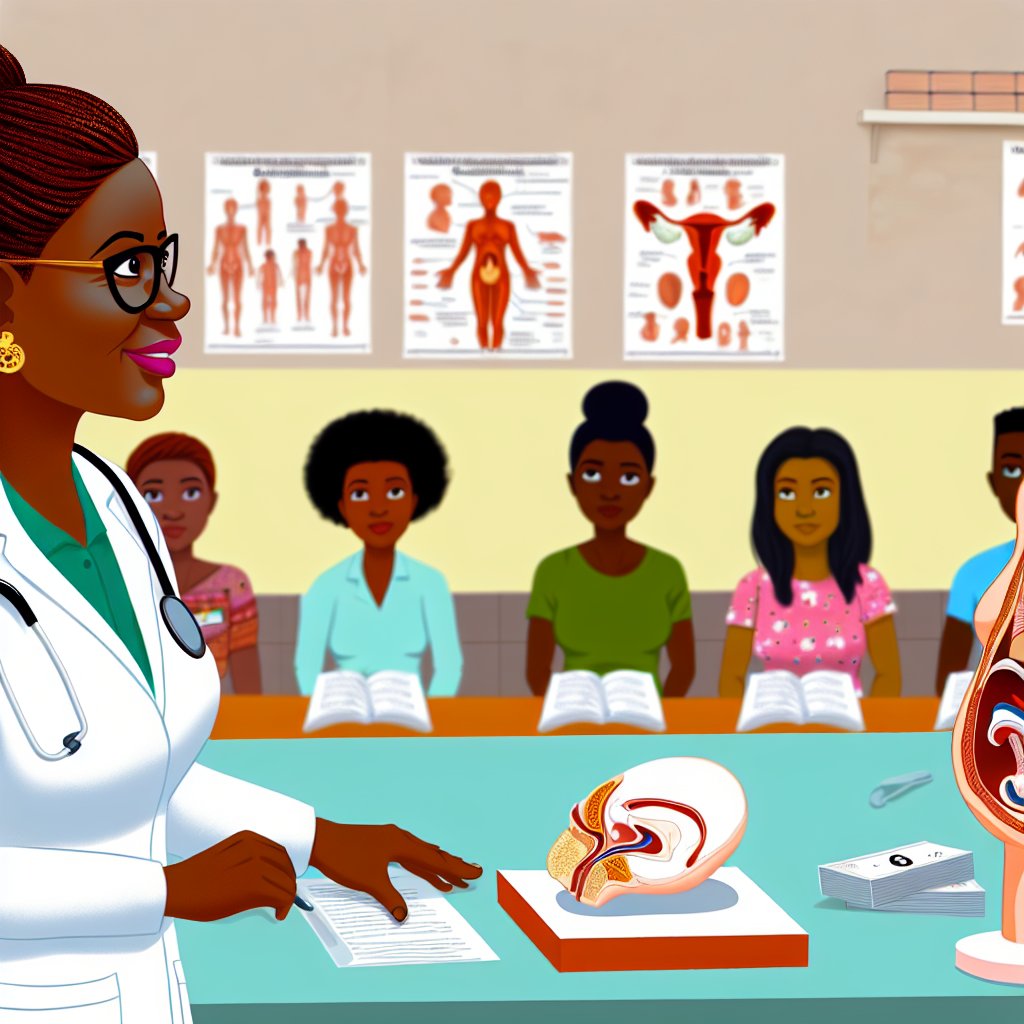Introduction:
Obstetricians play a crucial role in maternal and child healthcare in Nigeria.
The maternal mortality rate is high in this country.
Existing training programs for obstetricians in Nigeria focus on improving medical skills.
These programs also enhance knowledge specific to maternal care.
Educational Requirements:
To become an obstetrician in Nigeria, you must complete a Bachelor of Medicine and Bachelor of Surgery (MBBS) degree.
This degree typically takes six years to complete at a recognized medical school in Nigeria.
After obtaining the MBBS degree, aspiring obstetricians must complete a one-year internship program.
The internship provides hands-on experience in various medical specialties, including obstetrics.
Following the internship, individuals must pass the Medical and Dental Council of Nigeria (MDCN) licensing examination.
This exam ensures that medical professionals meet the necessary standards to practice in Nigeria.
Once licensed, individuals can pursue postgraduate training in obstetrics and gynecology.
Postgraduate training typically involves a residency program that lasts for four to six years.
During the residency, aspiring obstetricians receive specialized training in labor and delivery, prenatal care, and gynecological surgeries.
Upon completing the residency program, individuals must pass the West African College of Surgeons (WACS) examination in obstetrics and gynecology.
Achieving certification from WACS demonstrates a high level of competency in the field of obstetrics.
Importance of a Strong Foundation in Medical Studies:
A strong foundation in medical studies is crucial for aspiring obstetricians in Nigeria.
Medical school provides essential knowledge and skills that form the basis of obstetrics practice.
Understanding anatomy, physiology, pharmacology, and pathology is essential for diagnosing and treating obstetric conditions.
A thorough understanding of medical ethics and patient care principles is essential for providing high-quality obstetric care.
Medical studies also teach aspiring obstetricians how to effectively communicate with patients and work as part of a healthcare team.
A solid foundation in medical studies prepares obstetricians to adapt to new treatments and technologies in the field.
Continuous learning and staying updated on the latest medical advancements are essential for providing evidence-based obstetric care.
The knowledge gained from medical studies helps obstetricians make informed decisions about patient care and treatment options.
A strong educational background instills confidence in obstetricians and enhances their ability to handle complex obstetric cases.
Ultimately, a strong foundation in medical studies is a cornerstone for success in the field of obstetrics in Nigeria.
By ensuring that aspiring obstetricians meet the educational requirements and have a solid foundation in medical studies, Nigeria can develop a skilled and competent workforce of obstetricians to improve maternal and child health outcomes in the country.
Training Institutions:
The key institutions in Nigeria include university teaching hospitals, specialist hospitals, and private clinics.
Top institutions known for producing highly skilled obstetricians are:
- Obafemi Awolowo University Teaching Hospitals Complex, Ile-Ife
– Offers residency programs in obstetrics and gynecology.
– Well-equipped facilities for hands-on training.
– Renowned faculty members with expertise in the field.
- Lagos University Teaching Hospital (LUTH)
– Offers postgraduate training in obstetrics and gynecology.
– Provides exposure to a diverse range of obstetric cases.
– Emphasizes practical skills development through simulations.
- Ahmadu Bello University Teaching Hospital, Zaria
– Provides comprehensive training in obstetrics and gynecology.
– Strong research culture to enhance evidence-based practice.
– Collaborates with international partners for global exposure.
- National Hospital, Abuja
– Offers obstetrics and gynecology residency programs.
– Focuses on innovative techniques in maternal healthcare.
– State-of-the-art facilities for hands-on training.
- University College Hospital, Ibadan
– Provides training programs in obstetrics and gynecology.
– Emphasizes holistic care for pregnant women.
– Collaborates with local communities for outreach programs.
- Federal Medical Centre, Abakaliki
– Offers specialized training in obstetrics and gynecology.
– Practical clinical rotations in diverse obstetric cases.
– Focus on improving maternal and child health outcomes.
- Babcock University Teaching Hospital, Ogun State
– Integrates obstetrics training with Christian principles.
– Emphasizes ethical practices in obstetric care.
– Small class sizes for personalized learning experience.
- Aminu Kano Teaching Hospital, Kano
– Provides residency training in obstetrics and gynecology.
– Exposure to high-risk obstetric cases for skill development.
– Mentoring by experienced obstetricians for career guidance.
These institutions play a crucial role in shaping the next generation of obstetricians in Nigeria through their rigorous training programs and diverse clinical experiences.
You Might Also Like: Dental Therapy Professional Associations in Nigeria
Duration and Structure of Training Programs:
Training programs for obstetricians in Nigeria typically span over several years.
This duration ensures that doctors are adequately prepared to handle the complexities of pregnancy and childbirth.
These programs are designed with a structured curriculum.
This structure provides a comprehensive education and hands-on experience in obstetrics.
Typical Length of Training Programs:
- Obstetrics training programs in Nigeria usually last for a minimum of 4 years.
- After completing medical school, aspiring obstetricians undergo a 1-year internship in a hospital setting.
- Following the internship, they must complete a 3-year residency training program in obstetrics and gynecology.
- Some doctors may choose to pursue additional specialization or fellowship training in subfields such as maternal-fetal medicine or reproductive endocrinology.
Curriculum and Structure of Training Programs:
- The curriculum of obstetrics training programs in Nigeria includes a mix of didactic lectures, clinical rotations, and hands-on training in labor wards and delivery rooms.
- Residents are exposed to a wide range of obstetric cases, from routine prenatal care to high-risk pregnancies and complicated births.
- They are trained in the management of obstetric emergencies such as postpartum hemorrhage, preeclampsia, and breech presentations.
- Residents also learn about fetal monitoring, ultrasound imaging, and surgical interventions like cesarean sections.
- Throughout their training, obstetricians-in-training are supervised by experienced faculty members who provide guidance and mentorship.
- Residents are required to maintain detailed logbooks of their clinical experiences and surgical procedures to track their progress and competencies.
- At the end of the training program, residents must pass a series of exams to become certified obstetricians and gynecologists.
Training programs for obstetricians in Nigeria are rigorous and comprehensive.
They aim to produce competent and skilled healthcare professionals.
These professionals can effectively manage the reproductive health needs of women in the country.
Find Out More: Ophthalmology Equipment: What Nigerian Clinics Use
Clinical Rotations and Practical Experience
Hands-on training in obstetrics is crucial for aspiring obstetricians.
Clinical rotations play a significant role in shaping the skills of future obstetricians.
Transform Your Career with Expert Guidance
Get personalized mentorship consulting that’s tailored to your unique path. Our expert advice is actionable and exclusive.
Get StartedDuring their training, aspiring obstetricians benefit greatly from clinical rotations and practical experience.
Exposure to Real-World Obstetric Cases
One of the key benefits of clinical rotations is the exposure to real-world obstetric cases.
Application of Theoretical Knowledge
Clinical rotations allow aspiring obstetricians to apply their theoretical knowledge in a practical setting.
Hands-On Skills Development
Through practical experience, future obstetricians develop essential hands-on skills required for their profession.
Building Confidence and Competence
By working directly with patients under supervision, aspiring obstetricians build confidence and competence in their abilities.
Learning from Experienced Professionals
Clinical rotations provide the opportunity to learn from experienced obstetricians and other healthcare professionals.
Exposure to Diverse Obstetric Cases
Working in different clinical settings exposes aspiring obstetricians to a wide range of obstetric cases and scenarios.
Understanding Patient-Centered Care
Through clinical rotations, future obstetricians learn the importance of providing patient-centered care and empathy towards their patients.
Clinical rotations and practical experience are vital components of training programs for obstetricians in Nigeria.
These hands-on opportunities not only enhance skills and knowledge but also shape the future of obstetric healthcare in the country.
You Might Also Like: Prominent Nigerian Parasitology Researchers

Certifications and Licensing:
Obtaining certifications and licenses is crucial for practicing as an obstetrician in Nigeria.
These credentials serve as proof of competence and compliance with regulatory standards.
Without proper certification and licensing, obstetricians may face legal repercussions or professional restrictions.
It is essential to understand the process of obtaining these credentials after completing training programs.
Importance of Obtaining Certifications and Licenses:
- Certifications validate the obstetrician’s knowledge and skills in the field.
- Licenses grant legal permission to practice obstetrics in Nigeria.
- Having proper credentials instills trust and confidence in patients and colleagues.
- Credentialing ensures that obstetricians adhere to ethical and professional standards.
Process of Obtaining Certifications and Licenses:
- After completing training programs, obstetricians must apply for certification from relevant professional bodies.
- They may need to pass certification exams or submit documentation of training and experience.
- Obtaining a license involves registering with the Medical and Dental Council of Nigeria (MDCN).
- Applicants must meet certain criteria, such as having completed an approved training program.
Gain More Insights: Key Skills for Nigerian Anaesthesiologists
Continuing Education and Professional Development
Obstetricians need to continuously update their skills and knowledge to provide top-quality care.
There are various opportunities available for continuing education and professional development in the field.
One of the key aspects of being a successful obstetrician is the ability to stay current with the latest developments in the field.
As medical knowledge continues to evolve and new research emerges, it is essential for obstetricians to update their skills and knowledge to provide the best possible care for their patients.
Continuing education programs offer obstetricians the opportunity to learn about the latest techniques, treatments, and technologies in their field.
These programs may include workshops, seminars, conferences, and online courses that cover a wide range of topics related to obstetrics.
Attending conferences and seminars can also provide obstetricians with the chance to network with other professionals in their field.
This networking can lead to collaborations, mentorships, and new opportunities for professional growth and development.
Professional development opportunities for obstetricians may also include participation in research projects, writing articles for medical journals, and attending specialized training programs.
These experiences can help obstetricians stay at the forefront of their field and continue to provide high-quality care to their patients.
Many organizations and institutions offer continuing education and professional development programs specifically designed for obstetricians.
These programs may be tailored to different levels of experience, from new graduates to seasoned professionals, and may cover a wide range of topics, from best practices in patient care to the latest advancements in medical technology.
Some organizations also offer certification programs for obstetricians, which can help them demonstrate their expertise and commitment to ongoing professional development.
These certifications may be required for certain job positions or can simply serve as a way for obstetricians to showcase their skills and knowledge to patients and colleagues.
Continuing education and professional development are essential components of a successful obstetrician’s career.
By staying current with the latest advancements in the field and actively seeking out opportunities for growth and learning, obstetricians can provide the highest level of care for their patients and continue to thrive in their profession.
Importance of Training for Obstetricians in Nigeria
Training programs for obstetricians in Nigeria are crucial for improving maternal and infant health outcomes.
These programs provide comprehensive and well-structured training to enhance their skills and knowledge.
Ultimately, this leads to better patient care and outcomes.
Continuous education and training in obstetrics are vital for healthcare professionals in Nigeria.
Such programs help reduce maternal and infant mortality rates.
They also contribute to the overall improvement of the healthcare system.
Investing in training programs for obstetricians is essential.
Obstetricians need to be equipped to handle the challenges of childbirth and pregnancy complications effectively.
Ongoing training enables them to stay updated on the latest practices and technologies.
By doing so, they ultimately provide better care for their patients.
Additional Resources
Vanderbilt-Nigeria Biostatistics Training Program (VN-BioStat …
An exploration of profile, perceptions, barriers, and predictors of …




